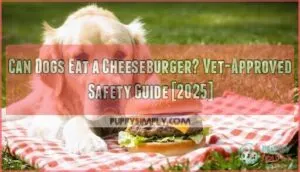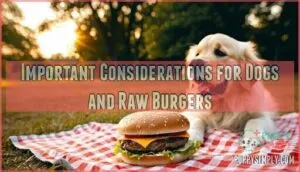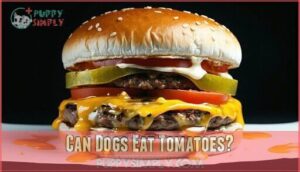This site is supported by our readers. We may earn a commission, at no cost to you, if you purchase through links.

While the plain beef won’t hurt them, cheeseburgers pack ingredients that spell trouble for your furry friend.
Onions and garlic can damage their red blood cells, while cheese often causes stomach upset.
The bun’s empty calories add unnecessary weight, and condiments like ketchup might contain xylitol, which is toxic to dogs.
High sodium levels in seasoned meat can also cause problems.
If you want to share, stick to a small piece of plain, cooked ground beef instead.
Understanding each ingredient’s impact helps you make safer choices.
Table Of Contents
- Key Takeaways
- Can Dogs Eat a Cheeseburger?
- Feeding Dogs Hamburgers
- Important Considerations for Dogs and Raw Burgers
- Grilled Meats and Dogs
- Can Dogs Eat Bread?
- Can Dogs Eat Lettuce?
- Can Dogs Eat Tomatoes?
- Can Dogs Eat Cheese?
- Frequently Asked Questions (FAQs)
- Can dogs eat cheeseburgers?
- Can dogs eat Hamburger?
- Should I give my Dog a Burger?
- Should you share a hamburger with your dog?
- Can a dog eat a cheeseburger if he is lactose intolerant?
- Can dogs eat hamburgers if they have pancreatitis?
- What happens if a dog eats a cheeseburger?
- Are dogs allowed to eat cheeseburgers?
- Are McDonald’s cheeseburgers ok for dogs?
- Is burger cheese good for dogs?
- Conclusion
Key Takeaways
- Don’t feed your dog cheeseburgers – The combination of toxic ingredients, like onions and garlic, high sodium content, and processed cheese, creates serious health risks, including red blood cell damage and digestive upset.
- Plain cooked beef is safe in moderation – You can share small portions of unseasoned, lean ground beef that’s thoroughly cooked, but skip all seasonings, marinades, and high-fat content that can trigger pancreatitis.
- Cheese causes problems for many dogs – Most dogs are lactose intolerant, so the cheese in cheeseburgers will likely cause stomach upset, diarrhea, and digestive issues, even if you remove other harmful ingredients.
- Watch out for hidden dangers – Condiments, like ketchup, may contain xylitol (toxic to dogs), while the bun adds empty calories that contribute to weight gain, making homemade alternatives much safer than commercial burgers.
Can Dogs Eat a Cheeseburger?
Dogs can eat cheeseburgers, but it’s complicated. Most commercial cheeseburgers contain toxic ingredients like onions and garlic that pose serious cheeseburger risks for dogs.
While dogs can technically eat cheeseburgers, most contain dangerous ingredients that make them risky for your furry friend.
The high salt and fat content can trigger health risk symptoms including vomiting and pancreatitis. However, safe cheeseburger prep is possible using plain, unseasoned cooked beef and dog-safe cheese in small portion sizes.
For better dog nutrition and health, consider alternatives like plain grilled chicken or specially-made dog treats instead of sharing your burger. Homemade versions should use lean ground beef for safety.
Feeding Dogs Hamburgers
Many pet parents wonder if their furry friends can safely enjoy hamburgers. While plain, cooked ground beef offers excellent protein for dogs, most commercial burgers pose serious cheeseburger risks for dogs due to harmful seasonings and high fat content.
Here are three critical safety rules for homemade burgers:
- Choose lean meat choices – Select unseasoned ground turkey, chicken, or lean beef
- Master proper cooking methods – Always boil or bake meat thoroughly to eliminate bacteria
- Practice strict portion control – Limit servings to prevent pancreatitis and obesity
Seasoning alternatives should never include salt, garlic, or onions, as these toxic foods for dogs can cause severe illness. Even seemingly harmless options like a McDonald’s plain patty can pose risks.
When preparing homemade burgers for your pup, keep ingredients simple and portions small. Your dog’s nutrition depends on careful preparation rather than convenient shortcuts.
Important Considerations for Dogs and Raw Burgers
Raw meat poses serious threats to your dog’s health through bacterial contamination. Raw burgers contain dangerous pathogens like salmonella and E. coli that can cause severe food poisoning in dogs.
Never risk your pup’s health with raw burgers – bacteria like salmonella can cause serious poisoning in dogs.
Puppy vulnerability increases due to developing immune systems. Many owners tout the benefits of raw diets for their pets.
| Raw Meat Risks | Symptoms | Safe Handling |
|---|---|---|
| Salmonella infection | Vomiting, diarrhea | Cook meat thoroughly |
| E. coli poisoning | Lethargy, fever | Avoid cross-contamination |
| Bacterial contamination | Dehydration | Use separate cutting boards |
| Poor dog digestion | Stomach pain | Wash hands frequently |
| Food poisoning | Loss of appetite | Choose cooking alternatives |
Always cook meat completely before serving.
Grilled Meats and Dogs
When you’re firing up the grill, your dog’s safety should be your top priority. Grilled meats can offer excellent protein, but grilling safety requires careful attention to preparation and ingredients.
Plain, unseasoned beef or chicken works best for your pup. Skip the marinades entirely – marinating concerns arise because most contain garlic, onions, or excessive salt that’s toxic to dogs.
These toxic ingredients can cause serious health problems, from digestive upset to poisoning. Fat content matters substantially. Trim visible fat before grilling to prevent pancreatitis and other dog health risks.
High-fat foods strain your dog’s digestive system and can lead to serious complications. Never give your dog grilled bones – bone hazards include choking, intestinal blockages, and splintering that can pierce internal organs.
Cooked bones become brittle and dangerous. In addition to these dangers, cooked bones splinter easily, creating sharp fragments that can cause internal damage.
Practice portion control by offering small, bite-sized pieces. A few plain grilled meat chunks make a safe treat when prepared properly for ideal dog digestion.
Can Dogs Eat Bread?
Looking at grilled meats brings us to another cheeseburger component: the bun. Your dog can eat bread in moderation, but it’s not exactly a superfood for your furry friend. Most dogs handle plain bread without issues, though it offers minimal nutritional value beyond carbohydrates.
Watch out for these bread-related concerns when considering your dog’s diet:
- Yeast Concerns: Raw bread dough can expand in your dog’s stomach and produce alcohol, creating a dangerous situation
- Bread Allergies: Some dogs develop sensitivities to wheat or gluten, causing digestive upset or skin irritation
- Portion Control: Bread is high in calories and can contribute to weight gain if given frequently
White and wheat bread are generally safe options, but skip varieties with raisins, nuts, or artificial sweeteners. These ingredients can be toxic to dogs. Specifically, be cautious of keto breads, as they sometimes contain xylitol can be fatal. For better Bread Alternatives, consider offering small pieces of plain, cooked sweet potato or rice cakes. Remember, bread should never replace balanced dog nutrition or become a regular part of your pup’s dog diet.
Can Dogs Eat Lettuce?
Yes, dogs can safely eat lettuce as part of their cheeseburger experience. This leafy green offers lettuce benefits like fiber and hydration without harmful toxins.
All lettuce types—iceberg, romaine, and butter lettuce—are dog-friendly options. For preparation methods, wash thoroughly and chop into bite-sized pieces to prevent choking.
Practice portion control by offering small amounts as treats, not meal replacements. While potential risks are minimal, avoid seasoned or dressed lettuce.
Plain lettuce makes a healthy, low-calorie addition to your dog’s diet when served appropriately. Excessive consumption may cause digestive issues like diarrhea.
Can Dogs Eat Tomatoes?
Tomato toxicity creates confusion for many dog owners wondering about cheeseburger toppings. While ripe red tomatoes offer some benefits and aren’t as dangerous as onion or other toxic foods, they’re still not recommended for dogs.
Green tomatoes contain higher levels of harmful compounds that can cause digestive upset. Symptoms include tomatine poisoning in severe cases.
Here’s what you need to know about dog safety:
- Ripe tomatoes are less toxic than green ones
- Small amounts rarely cause serious problems
- Serving suggestions include avoiding them entirely
Skip tomato-topped cheeseburgers for your pup’s wellbeing, as they can lead to digestive upset and other health issues.
Can Dogs Eat Cheese?
Cheese can be a dog-friendly addition to homemade cheeseburgers, but lactose intolerance affects many pups.
While cheese provides protein and calcium benefits, portion control remains vital for dog health. Safe cheeses like mozzarella and cottage cheese work better than processed varieties.
As some cheeses are toxic, it’s important to know that dogs should never eat any blue cheese.
| Safe Options | Avoid These |
|---|---|
| Low-fat mozzarella | Blue cheese |
| Cottage cheese | Processed cheese |
| Plain cheddar | High-sodium varieties |
Consider cheese alternatives like plain yogurt if your dog shows digestive upset. Always introduce new foods gradually.
Frequently Asked Questions (FAQs)
Can dogs eat cheeseburgers?
Playing with fire, feeding your pup a cheeseburger isn’t ideal.
You can share plain, cooked hamburger meat and mild cheese occasionally, but skip onions, garlic, and seasoning—they’re toxic to dogs.
Can dogs eat Hamburger?
Plain, unseasoned cooked hamburger meat makes a great protein source for your dog.
You’ll want to avoid raw meat, salt, garlic, and onions though.
Boiled ground beef works best and prevents digestive upset, with boiled ground beef being a key consideration.
Should I give my Dog a Burger?
Back in medieval times, knights wouldn’t share their feast with hounds, and you shouldn’t either.
Don’t give your dog a burger—onions, garlic, and seasonings are toxic.
Plain, cooked meat‘s fine, but skip restaurant burgers entirely.
Should you share a hamburger with your dog?
You shouldn’t share a regular hamburger with your dog.
Remove onions, pickles, and seasonings first.
Plain, cooked beef is fine occasionally, but the high fat and salt content makes sharing risky.
Can a dog eat a cheeseburger if he is lactose intolerant?
No, you shouldn’t give your lactose intolerant dog a cheeseburger.
The cheese will cause digestive upset, diarrhea, and stomach pain.
Even without cheese, burgers contain harmful seasonings and high fat content.
Can dogs eat hamburgers if they have pancreatitis?
Pancreatitis patients shouldn’t partake in hamburgers.
High-fat meat triggers painful flare-ups in dogs with this condition.
You’ll need to stick with low-fat, vet-approved foods to keep your pup’s pancreas calm and comfortable.
What happens if a dog eats a cheeseburger?
If your dog eats a cheeseburger, they’ll likely experience upset stomach, diarrhea, or vomiting.
The high fat, salt, and potentially toxic ingredients like onions can cause serious digestive issues or pancreatitis.
Are dogs allowed to eat cheeseburgers?
While it’s not exactly forbidden fruit, you shouldn’t regularly feed your dog cheeseburgers.
Plain, unseasoned meat and safe cheese are okay occasionally, but avoid onions, garlic, and excessive salt that harm dogs.
Are McDonald’s cheeseburgers ok for dogs?
No, McDonald’s cheeseburgers aren’t safe for your dog. They’re loaded with salt, onions, pickles, and other harmful ingredients that can cause serious health problems. Stick to plain, homemade options instead.
Is burger cheese good for dogs?
Certain cheeses like cheddar, Swiss, and mozzarella are safe for your dog in small amounts.
However, many dogs can’t digest dairy well, causing stomach upset.
Skip processed cheese and choose plain, low-fat varieties occasionally.
Conclusion
Picture your dog’s digestive system like a delicate recipe – adding the wrong ingredients creates chaos.
You’ve learned that dogs shouldn’t eat cheeseburgers due to harmful components like onions, garlic, and high sodium content.
While plain beef is safe, the complete burger poses real health risks.
Your best choice is offering small portions of unseasoned, cooked ground beef instead.
Remember, when wondering "can dogs eat a cheeseburger," the answer remains a clear no for their safety and wellbeing.
- https://www.reddit.com/r/dogs/comments/11pbx3r/can_i_give_my_dog_a_cheeseburger/
- https://www.akc.org/expert-advice/vets-corner/can-dogs-eat-hamburger/
- https://www.fetchpet.com/the-dig/can-dogs-eat-hamburgers
- https://www.theholistichound.com/blogs/news/can-my-dog-eat-this-burgers?srsltid=AfmBOoo_T9KZsTLFsv-6PZjPqty-mDp7twC7uLqrCUjezFHRF4A5PQOn
- https://www.justanswer.com/dog-health/l3hkt-home-find-dog-ate-whole-burger-blt.html











